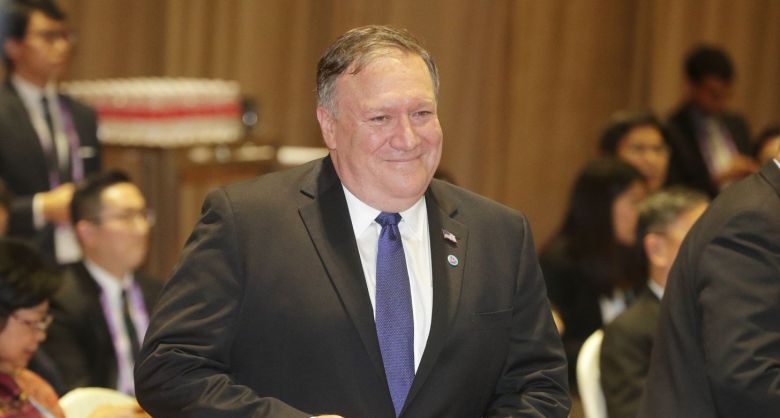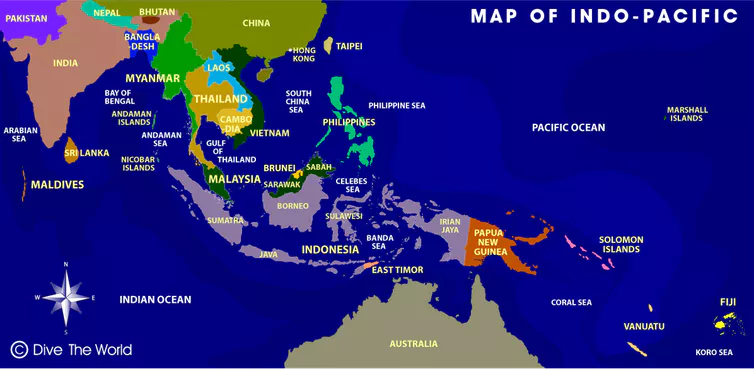US commits to Indo-Pacific
August 4, 2018 | Expert Insights

US Secretary of State Mike Pompeo on Saturday announced US$300 million in funding for security cooperation in the Indo-Pacific region. This is in addition to America's US$113 million economic initiatives unveiled at the Indo-Pacific Business Forum last week.
Background
The Indo-Pacific, sometimes known as the Indo-West Pacific, is a biogeographic region of Earth's seas, comprising the tropical waters of the Indian Ocean, the western and central Pacific Ocean, and the seas connecting the two in the general area of Indonesia. With the rising involvement of US in the new growth areas of Asia, the idea of the Indo-Pacific Economic Corridor was conceptualized during the US-India Strategic Dialogue of 2013. Secretary of State John Kerry referred to the potential of the Indo-Pacific Economic Corridor, in transforming the prospects for development and investments as well as for trade and transit between the economies of South and Southeast Asia Indo-Pacific economic corridor.
The 51st ASEAN Foreign Ministers’ Meeting (AMM) and Related Meetings were held in Singapore between 30th July to August 4th. The meetings witnessed Foreign Ministers take stock of progress in regional cooperation, prepare and respond to disasters, restore commitment in free trade and chart the way forward towards implementing the ASEAN Leaders Vision for a Resilient and Innovate ASEAN. Singapore’s Minister for Foreign Affairs Dr Vivian Balakrishnan chaired the 51st AMM and other related meetings.
US Secretary of State Mike Pompeo at the Indo-Pacific Business Forum in Washington revealed America’s infrastructure development plan for the Indo-Pacific region. Along with US$113 million in direct government investment, the plan would double the global spending cap for the development finance corporation to US$60 billion, which could be used to provide private companies with loans for projects overseas.US will spend US$25 million to expand US technology exports to the region, add nearly US$50 million this year to help countries produce and store their energy resources and create a new assistance network to boost infrastructure development.

Analysis
US Secretary of State Mike Pompeo on Saturday pledged US$300 million to enhance security in the Indo-Pacific region, where US and China are competing for influence. Mr. Pompeo, who is in Singapore for ASEAN-related meetings this week, said, "As part of our commitment to advancing regional security in the Indo-Pacific, the US is excited to announce US$300 million in new funding to reinforce security cooperation throughout the entire region."
This new security assistance by the US is expected to advance shared priorities in maritime security, humanitarian assistance and peacekeeping capabilities and countering transnational threats. "Throughout my ASEAN engagement I've conveyed President Trump's commitment to this vital part of the role that continues to grow in importance," Mr. Pompeo said at a press conference.
Last week at the Indo-Pacific business forum, Mr. Pompeo announced an initiative concerning the Trump administration’s commitment to engage with countries in the Indo-Pacific region. Part of the US$113 million in direct investment for the region includes US$10 million in funding to support economic programming, much of which will fall under the US-Asean Connect programme. Addressing, this initiative again at the press conference on Saturday, he said, “Economically, President Trump recognises the long-term strategic importance of one of the world’s most competitive regions. The Indo-Pacific has been and will be a major engine of economic growth.”
The Trump administration is working with Congress to encourage the passage of a Bill, in the US Senate, that will more than double the US government’s development finance capacity to US$60 billion to support US prime investment strategic opportunities abroad. “These initiatives are strategic investments designed to spur our partners’ engagement with American companies, the greatest force for prosperity in the world,” said Mr Pompeo.
Mr. Pompeo also expressed his views on ongoing security challenges and regional issues. He said that he has pressed his ASEAN counterparts to maintain diplomatic and economic pressure on North Korea to achieve denuclearisation. Pompeo said he discussed Chinese militarisation of the South China Sea and the importance of a rules-based order in the region with the ASEAN nations.
The US also “addressed important steps to resolve the humanitarian crisis in the Rakhine state”, while it supported Myanmar’s ongoing democratisation transition, said Mr Pompeo. “The progress of these and other critical security issues is essential to a free and open Indo-Pacific. ASEAN will remain at the centre of this effort,” he added.
The ASEAN meeting also coincided with a bitter trade dispute between the US and China. Pompeo said, “President Trump inherited an unfair trade regime, American workers in American companies are not treated reciprocally or fairly by the Chinese, and efforts of the Trump administration are to right that, to correct that, to adjust that.”
Counterpoint
Polls in the region have shown that America’s reputation has deteriorated immensely since Trump withdrew the US from the Trans-Pacific Partnership (TPP) free-trade deal, with a growing number of Asian nations questioning Washington’s dependability.
Eswar Prasad, a Cornell University trade professor and former head of the IMF’s China division, called the US initiatives small compared with the billions of US dollars in investments that China is pouring into the region. Some analysts see the new programme as an aggressive tactic aimed squarely at China.
Assessment
Our assessment is that US’s increased commitment to the Indo-Pacific is to counter growing Chinese influence in the region. For US’s initiatives to be sustained, we feel that they must also consider a more proactive trade agenda that targets countries that will be strategically significant to the US in the future. We believe that the US can also strengthen rule of law in these countries so they are not susceptible to Chinese bribery. We feel that the announcement of the new fund package will play a significant part in the escalations of the ongoing trade war.








Comments